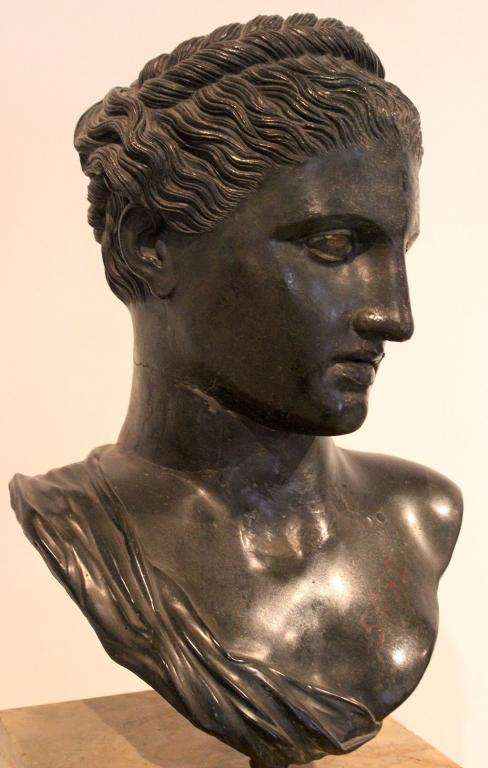Acts 25-26 tells of Paul’s appearance before Agrippa, the king of Judaea, and his sister Bernice. I came across an article that tells “the rest of the story” about Bernice, who has been called the Jewish queen of Rome. With her relationship with the future emperor Titus–the very man who destroyed Jerusalem and the Temple–many Romans feared that she could establish a Jewish imperial dynasty.
The New Testament records how Paul, in the custody of the Roman governor Festus, was brought before King Herod Agrippa II and his sister. “Agrippa and Bernice came with great pomp, and they entered the audience hall with the military tribunes and the prominent men of the city” (Acts 25:23). Paul then defended himself, giving a detailed account of his own conversion and the message of Christ. This led to an interesting response from the king:
King Agrippa, do you believe the prophets? I know that you believe.” And Agrippa said to Paul, “In a short time would you persuade me to be a Christian?” And Paul said, “Whether short or long, I would to God that not only you but also all who hear me this day might become such as I am—except for these chains. Then the king rose, and the governor and Bernice and those who were sitting with them. (Acts 26:27-30)
In article in the Jewish magazine Tablet, former archaeologist Frederic Brandfon discusses the recurring anti-semitic fear that Jews are going to take over by replacing non-Jews. He traces this fear back to the Roman alarm over Bernice.
From Fredric Brandfon, Berenice, the Jewish Queen of Rome, and the Origins of Replacement Theory:
The earliest example of the fear that Jews might overturn and replace the social order with their own people probably occurred in Rome during the first century CE. A circumstance arose that threatened Roman dominion over the Mediterranean world: The Flavian family line was in danger of being replaced through a Jewish takeover.
In 70 CE, the Roman Emperor Vespasian’s son, Titus, had defeated the Judean rebellion, destroying Jerusalem and the Second Temple. However, once victorious, he chose as his willing consort Berenice, the sister of Agrippa II, the former king of conquered Judaea. This choice was not so odd as it may sound: Berenice and her brother had opposed the Jewish revolt from the beginning. Along with the spoils of the Temple, Titus brought Berenice back to Rome, where, according to Cassius Dio (Roman History LXV 15), she lived with him as if she were his empress, exerting considerable power.
Some Romans were troubled by the romance of Titus and Berenice and spoke out against her. In her prior marriage to the king of Pontus, Berenice had required that he convert to Judaism and be circumcised. There was probably concern that Titus would be convinced to do the same. The result would be a Jewish emperor of Rome, in effect reversing the outcome of the Jewish War. Worse, Titus and Berenice’s children would be Jewish, ensuring that future emperors would be Jewish. In other words, the Roman Empire would be in Jewish hands.
Titus understood that consequence, and the necessity of preventing such an outcome. Indeed, preceding dynasties had also faced the charge of Judaizing the empire. Emperor Claudius, who preceded Titus by less than 20 years, had a visiting dignitary, Isidorus of Alexandria, executed for accusing him of being Jewish. A few years later, Nero, who ruled Rome until 68 CE, just two years before the Flavians, could not escape association with Jews. His wife was a “God-Fearer,” that is a person who engaged in some Jewish practices without converting. There was precedent, therefore, for both Titus’ romantic entanglement and the accusations that came with it.
Titus understood that Berenice’s potential ascendance to imperial power was a threat, real or imagined, to the future of the nascent Flavian Dynasty, which like all dynasties, needed stability and not controversy. Berenice was forced into exile.
The story of Berenice is the story of Jewish replacement boiled down to one person, a woman, who could, by herself, effect the replacement of the Flavian Dynasty with Jewish emperors.
I doubt the likelihood that Bernice could have started a dynasty of Jewish emperors. That office was not hereditary, as such, and the Senate and the Pretorian Guards would surely have installed someone else rather than a person who rejected the pantheon of Roman gods. Besides, though she exercised considerable power in Rome under Vespasian, as soon as his son Titus was formally made Emperor, he succumbed to the pressure and sent her away. Titus might have brought her back eventually, but he died only two years later. (Read this.)
Nevertheless, not very long afterwards, Rome did put away their pagan deities, turning to the Jewish scriptures and worshipping a crucified Jew.
Illustration: The bust of a woman identified as Berenice, Pompei, from Miguel Hermoso Cuesta [CC BY-SA (https://creativecommons.org/licenses/by-sa/3.0)] via Wikimedia Commons.

















